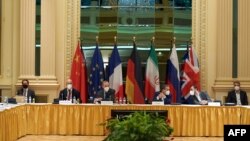Parties to the 2015 international nuclear agreement with Iran wrapped up a third round of talks on May 1 focused on bringing the United States and Iran back into full compliance with the deal, with negotiators in Vienna giving contrasting accounts of the tasks ahead.
Senior officials from China, Germany, France, Russia, Britain, and Iran said they would adjourn until May 7.
European diplomats from the so-called E3 -- France, Britain, and Germany -- said the talks had moved slowly.
"We have much work, and little time, left. Against that background, we would have hoped for more progress this week," E3 diplomats said in a statement.
Officials have said they hope to reach a deal by May 21, when an agreement between Tehran and the UN nuclear watchdog on continued monitoring of some Iranian nuclear activities is due to expire.
"We have yet to come to an understanding on the most critical points. Success is by no means guaranteed, but not impossible," they added.
The talks are focused on creating a road map for Washington to lift its sanctions on Iran and Tehran to reinstate restrictions on its nuclear program.
Iran's delegation head, Deputy Foreign Minister Abbas Araqchi, reiterated that Tehran expects the United States to lift sanctions across a range of sectors, including oil, banks, and most individuals and institutions.
"There are differences, big ones in fact, but since there has also been progress, we will continue negotiations next week," Araqchi told Iranian media. "We will negotiate until the two sides' positions come closer and our demands are met," he said.
"If they are met there will be an agreement, if not there will naturally be no agreement," he added.
Earlier, U.S. national-security adviser Jake Sullivan said the talks were in "an unclear place.”
"We've seen willingness of all sides, including the Iranians, to talk seriously about sanctions relief restrictions and a pathway back into the JCPOA," Sullivan said at an April 30 security event, referring to the Joint Comprehensive Plan of Action, the formal name of the nuclear deal.
Russia's ambassador to the UN nuclear watchdog, Mikhail Ulyanov, told reporters a breakthrough would require more diplomacy.
"We need simply to continue diplomatic, day-to-day work, and we have all the reasons to expect that the outcome, [the] final outcome, will be successful and it will come quite soon, in a few weeks," said Ulyanov, who is one of the more optimistic voices at the talks.
The talks began last month in Vienna with the remaining parties to the deal. The United States does not have a representative at the table because it left the deal, but European diplomats are acting as intermediaries between the Iranian and U.S. delegations.
U.S. President Joe Biden says he wants to rejoin the deal his predecessor Donald Trump abandoned in 2018, reimposing sanctions against Tehran. Iran responded as of 2019 by breaching many of the deal's limits on its nuclear activities.
The Biden administration is considering a rollback of some of the most stringent Trump-era sanctions in a bid to get Iran to come back into compliance with the nuclear agreement, according to information from current and former U.S. officials and others familiar with the matter.
Outside the talks in Vienna, other challenges remain.
Sabotage suspected to have been carried out by Israel recently struck Iran's Natanz nuclear site, causing an unknown amount of damage. Tehran retaliated by beginning to enrich a small amount of uranium up to 60 percent purity, the highest level that Iran has reached.










